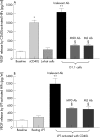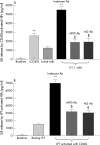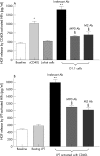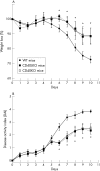Critical role of the CD40 CD40-ligand pathway in regulating mucosal inflammation-driven angiogenesis in inflammatory bowel disease
- PMID: 17317789
- PMCID: PMC1954974
- DOI: 10.1136/gut.2006.111989
Critical role of the CD40 CD40-ligand pathway in regulating mucosal inflammation-driven angiogenesis in inflammatory bowel disease
Abstract
Background and aims: Angiogenesis is a novel component in inflammatory bowel disease (IBD) pathogenesis. We have previously shown that immune-nonimmune interactions through the CD40-CD40-ligand (CD40L) pathway might sustain gut inflammation, although their effect on regulating inflammation-driven angiogenesis is unknown. The present study evaluated the role of the CD40-CD40L interaction in the promotion of immune-mediated angiogenesis in IBD.
Methods: Human nonimmune cells of colonic origin-namely, human intestinal fibroblasts (HIFs) and human intestinal microvascular endothelial cells (HIMECs)-were activated with either soluble CD40L (sCD40L), or CD40(+) D1.1 cells or CD40L-activated lamina propria T (LPT) cells before measuring pro-angiogenic cytokine release. Blocking antibodies to either CD40 or CD40L were used to disrupt the CD40-CD40L interaction. The dextran sodium sulphate (DSS) model of experimental colitis in CD40 and CD40L knockout mice was established to assess whether the CD40-CD40L pathway was implicated in controlling inflammation-driven angiogenesis in vivo.
Results: Engagement of CD40 on HIFs promoted the release of vascular endothelial growth factor (VEGF), interleukin-8 (IL-8) and hepatocyte growth factor (HGF). LPT cells were potent inducers of pro-angiogenic cytokine secretion by HIFs. Supernatants from sCD40L-activated HIFs induced migration of HIMECs and tubule formation, both of which were inhibited by blocking antibodies to either VEGF, IL-8 or HGF. Both CD40- and CD40L-deficient mice were protected from DSS-induced colitis and displayed a significant impairment of gut inflammation-driven angiogenesis, as assessed by microvascular density.
Conclusions: The CD40-CD40L pathway appears to be crucially involved in regulating inflammation-driven angiogenesis, suggesting that strategies aimed at blocking CD40-CD40L interactions might be beneficial in acute and chronic intestinal injury.
Conflict of interest statement
Competing interest statement: None declared.
Similar articles
-
Angiogenesis as a novel component of inflammatory bowel disease pathogenesis.Gastroenterology. 2006 Jun;130(7):2060-73. doi: 10.1053/j.gastro.2006.03.054. Gastroenterology. 2006. PMID: 16762629
-
CD40-CD40 ligand mediates the recruitment of leukocytes and platelets in the inflamed murine colon.Gastroenterology. 2007 Mar;132(3):955-65. doi: 10.1053/j.gastro.2006.12.027. Epub 2006 Dec 17. Gastroenterology. 2007. PMID: 17324402
-
VEGF-A links angiogenesis and inflammation in inflammatory bowel disease pathogenesis.Gastroenterology. 2009 Feb;136(2):585-95.e5. doi: 10.1053/j.gastro.2008.09.064. Epub 2008 Oct 7. Gastroenterology. 2009. PMID: 19013462
-
CD40-CD40 ligand interactions in oxidative stress, inflammation and vascular disease.Trends Mol Med. 2008 Dec;14(12):530-8. doi: 10.1016/j.molmed.2008.09.006. Epub 2008 Oct 30. Trends Mol Med. 2008. PMID: 18977174 Review.
-
Role of CD40 and B7 costimulators in inflammatory bowel diseases.Acta Biomed. 2003;74 Suppl 2:65-70. Acta Biomed. 2003. PMID: 15055038 Review.
Cited by
-
CD40 Ligand-CD40 Interaction Is an Intermediary between Inflammation and Angiogenesis in Proliferative Diabetic Retinopathy.Int J Mol Sci. 2023 Oct 25;24(21):15582. doi: 10.3390/ijms242115582. Int J Mol Sci. 2023. PMID: 37958563 Free PMC article.
-
Novel uses for anti-platelet agents as anti-inflammatory drugs.Br J Pharmacol. 2007 Dec;152(7):987-1002. doi: 10.1038/sj.bjp.0707364. Epub 2007 Jul 2. Br J Pharmacol. 2007. PMID: 17603547 Free PMC article. Review.
-
Anthocyanins and their physiologically relevant metabolites alter the expression of IL-6 and VCAM-1 in CD40L and oxidized LDL challenged vascular endothelial cells.Mol Nutr Food Res. 2015 Jun;59(6):1095-106. doi: 10.1002/mnfr.201400803. Epub 2015 Apr 30. Mol Nutr Food Res. 2015. PMID: 25787755 Free PMC article.
-
Serum concentrations and clinical significance of soluble CD40 ligand in patients with multiple myeloma.Med Oncol. 2012 Dec;29(4):2396-401. doi: 10.1007/s12032-012-0203-2. Epub 2012 Mar 9. Med Oncol. 2012. PMID: 22403003
-
Enhanced platelet adhesion induces angiogenesis in intestinal inflammation and inflammatory bowel disease microvasculature.J Cell Mol Med. 2011 Mar;15(3):625-34. doi: 10.1111/j.1582-4934.2010.01033.x. J Cell Mol Med. 2011. PMID: 20158572 Free PMC article.
References
-
- Folkman J. Seminars in Medicine of the Beth Israel Hospital, Boston. Clinical applications of research on angiogenesis. N Engl J Med 19953331757–1763. - PubMed
Publication types
MeSH terms
Substances
LinkOut - more resources
Full Text Sources
Research Materials









